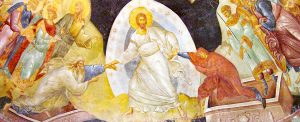Luke 15:11-32
Glory to God the Father, the Son, and the Holy Spirit. Amen.
This morning’s parable begins in the middle of chapter 15 of Saint Luke’s Gospel. Luke tells us at the very beginning exactly who this parable is addressed to:
Now the tax collectors and sinners were all gathering around to hear Jesus. But the Pharisees and the teachers of the law muttered, “This man welcomes sinners and eats with them” (Luke 15:1:1-2).
We’re likely to miss something if we don’t remember that the Lord is addressing religious folks and respected church members, specifically because they are scandalized at his sitting down with sinners.
I have heard people draw a moral from this, saying “We ought to be like Jesus and hang around with sinners.” Now that’s not all wrong, but it suggests we have forgotten who we are in this story. We’re not righteous and holy examples, we’re the sinners whom the Lord is visiting to invite us to become like him. Last week the Pharisee thought sinners were somebody else, not him. This week the older brother in the parable is sure there’s a difference between him and the younger son. Any reading of scripture that puts us in the position of righteous and upright judges has lost the plot.
So, to these keepers of the law who are too pure to meet sinners as equals, the Lord tells three parables.
Suppose one of you has a hundred sheep and loses one of them. Doesn’t he leave the ninety-nine in the open country and go after the lost sheep until he finds it? And when he finds it, he joyfully puts it on his shoulders and goes home. Then he calls his friends and neighbors together and says, ‘Rejoice with me; I have found my lost sheep.’ I tell you that in the same way there will be more rejoicing in heaven over one sinner who repents than over ninety-nine righteous persons who do not need to repent.
Or suppose a woman has ten silver coins and loses one. Doesn’t she light a lamp, sweep the house and search carefully until she finds it? And when she finds it, she calls her friends and neighbors together and says, ‘Rejoice with me; I have found my lost coin.’ In the same way, I tell you, there is rejoicing in the presence of the angels of God over one sinner who repents (Luke 15:4-8).
He’s set the stage. We are meant to expect a conclusion that says the Lord seeks, finds, and rejoices when one who’s lost gets found. The shepherd doesn’t condemn the lost sheep; the woman doesn’t rebuke her coin for falling behind the couch. But they’re moved with urgency to seek what’s gotten lost, and they celebrate with their friends and family when it’s found.
But the Pharisees and the teachers of the law muttered, “This man welcomes sinners and eats with them.”
So now the Lord tells his parable about the younger son who carelessly lost his inheritance in a far country, and also the older son who never left the father’s house. Who is the Lord addressing? He’s speaking to the Pharisees and the teachers. The older son stands for them. These churchgoers and religious folks saw sinners coming close to Jesus and they condemned them.
Here in church today, when a man comes in stinking of whiskey; a woman comes in unmarried and pregnant; a young person comes in with pink hair and you can’t tell if they’re a boy or a girl; a woman walks in the door of the Church straight from the abortion mill. What kind of reception can they expect?
You know what the older brother would think. “This sinner has squandered the likeness of God with abominations, they come here, and should they get a welcome as if they didn’t even need to repent?”
“Lord, I thank You that I’m not like those sinners…”
So the Lord tells his parable, saying, “It’s right that we should make merry and be glad, for your brother was dead and is alive again. He was lost and now he’s found!” Anyone who can’t rejoice at the baby steps of the prodigal beginning to return from a far country, isn’t sharing the heart of God.
Remember the Lord’s meeting with the Samaritan woman at the well? She’d had five husbands and the man she lives with now isn’t her husband. And what opened her heart to perceive the grace of God, was that the Lord looked her in the eyes. Saw her. Spoke to her. The Giver of the Law didn’t address her as a law breaker. But the Giver of water offered her the water of life.
The last time you bought a gallon of milk, if you didn’t go through the self-checkout lane, did you make eye contact with the person running the cash register? You probably didn’t have time for a meaningful conversation – but did they have, for just that second, a connection? A human, face to face encounter with someone who treated them as a person, an equal, the object of the love of God?
I hope that every person who walks in the door of this church receives a warm welcome and a father or mother or sister to let them know how glad we are that they’re here. “Bring out the best robe and put it on him, and put a ring on his hand and sandals on his feet! Bring the fatted calf, fire up the grill!”
* * *
In the parable, the younger son is far from home. He’s spent all his money and now he’s living hand to mouth. He’s hungry and miserable, and the Lord says, “He came to himself.” That’s not a euphemism; Literally, the Greek says that he arrived at himself.
What does he find when he arrives at himself? The same person that left the father’s house: Self-interested, manipulative, and clueless about his father.
“I’m starving here in this pigpen. But back home, Dad has food. I’ve burned all my bridges, I’m never getting that position back, but if I go back and really grovel, what’s the worst that can happen? I might at least get a paying job and three square meals.” And he works up his groveling speech: “Father, I have sinned against heaven, and before thee, and am no more worthy to be called thy son: make me as one of thy hired servants!”
But while he was still a long way off, his father saw him and was filled with compassion for him; he ran to his son, threw his arms around him and kissed him (Luke 15:20).
As he walks up the long driveway to the gate of his Father’s house, staring down at the road, rehearsing his speech, he is blindsided, wrapped up in strong arms and the sound of weeping. It’s his father.
This isn’t the story of a father being surprised and delighted when his lost son turns up at the front door. No, the father has been out at the property boundary every day, searching, hoping one day he’d see his lost son on the horizon. And when he sees his son, “still a long way off,” the father hitches up his robes and runs to him.
The son starts to give his prepared speech, but the father’s not having it. Keep your drama, the father seems to say, I have right now all I ever wanted: My child is home! The prodigal doesn’t even get halfway through his little speech when his father has already clothed him, put a ring on his finger, and ordered up a feast.
The Prodigal came to his old, self-centered false self in the far country and sought to preserve himself by negotiating with his father. But he came to his true self in his father’s driveway. Encountering his father’s unconditional love for him as his child, not because of his new-found morality, self-realization, bargains, offers to straighten up and fly right, not for any exhibits of guilt, shame and remorse.
In fact, what the Prodigal encountered in the driveway extended to him all the way in the far country in his worst state. The robe, the ring and the feast were not rewards. They were always there, just as they were, from the heart of the father, for the elder brother, who thought they were his reward for being faithful, working hard, doing his duty and obeying his Father.
Both sons got their father wrong: This is not a morality tale about the superiority of the younger brother’s repentance versus the elder brother’s legalism. They were both selfish and wrong-headed about their father: both thought they could manipulate the father’s relationship to them by saying the right words and doing the right work.
In the end this parable is about the Father who pours out his extravagant love on two children who don’t get Him.
* * *
Throughout the Liturgy we keep praying, in intercession for the world and for ourselves, “Lord, have mercy.”
That word mercy translates a Hebrew word that means steadfast lovingkindness. The prophet Jeremiah says, “The steadfast love of the Lord never ceases; his mercies never come to an end. They are new every morning; great is Thy faithfulness” (Lamentations 3:22-23).
When we pray for the peace of the whole world, the good estate of the holy churches of God, and the union of all, and we all say “Lord, have mercy,” we are saying: Be present in Your steadfast love, bring Your grace and justice and Your unconditional love into it. For those who travel by land, sea, and air; for the sick, the suffering, the imprisoned, and for their salvation, let us pray to the Lord. Lord, do mercy, lovingkindness, power, peace, healing, all Your good will. Pour out Your steadfast love on them all.
What is mercy? It is a King, a Master, a Father – who forgives a debt, a betrayal, an inadvertent shortcoming, a deception, a willful moral failure, a blindness to right and good — and restores the offender. He saves because He wants to (and because no one can stop Him!) And the Lord can do this, because of who He is, not in response to what the offender offers.
He does not exact retribution, take vengeance or require satisfaction from some innocent third party to appease Himself, balance His books, or assuage His anger at the offender whom He loves. Most often, you are simply escorted into the Kingdom without even asking, because you didn’t dare to ask such outrageous grace, and yet the woman looking for her coin has picked you up. The shepherd says, Ah, there you are! And the Father puts you in a place in his household, before you are sure you’ve ever begun to repent.
Ultimately, God is in the business of healing and saving His creation, not destroying it, at any cost – including the life of his only-begotten Son. Which gives us a clue about how serious he is about this mercy thing.
This morning the Church has picked this passage of scripture to give us another signpost on the road into the Great Fast. Zacchaeus taught us to approach the fast in humility –because pride will destroy us and make our fast of no profit. The Pharisee and the tax collector warned us against comparing ourselves to one another and told us again that “God opposes the proud, but gives grace to the humble” (Proverbs 3:34; 1 Peter 5:5; James 4:6).
Today the church gives us a lesson in approaching our Father, not with a lot of religious language dramatic acts of repentance, but with trust. Because, while we have only just begun to seek the Lord, He has been seeking us. And if He has just now gathered us into His sheepfold, He’s just now given us a place in his household, He will not quickly let us go.
In a few minutes, we’ll receive Holy Communion. I’ll announce, “with the fear of God, with faith and love, draw near!”
A number of the Fathers note that in a great household there may be slaves, and servants, and the son who is the heir. Saint Nicodemos of the Holy Mountain says, “Fear of punishment is the way of a slave; desire for reward in the heavenly kingdom is the way of a hireling; but God’s way is that of a son, though love.”
Saint Clement of Alexandria says, “The perfect and mature person does not merely try to avoid evil, nor does he do good for fear of punishment; still less in order to qualify for the hope of a promised reward. The perfect person does good through love.”
At different times in our own life, we may be serving God out of fear of going to hell; or out of hope of reward in the heavenly Kingdom; or simply out of love, because God is good. And the Lord accepts our faith, even if it’s just the faith of a slave or a hireling. He wants you in his household. Here’s a ring and a robe and let’s feast on the fatted calf; We have eternity for you to learn to perfectly trust his love. So here and now, with the fear of God, with faith and love, wherever you are — Draw near to God. And he will draw near to you (James 4:8).
To the glory of God the Father, the Son, and the Holy Spirit. Amen.






